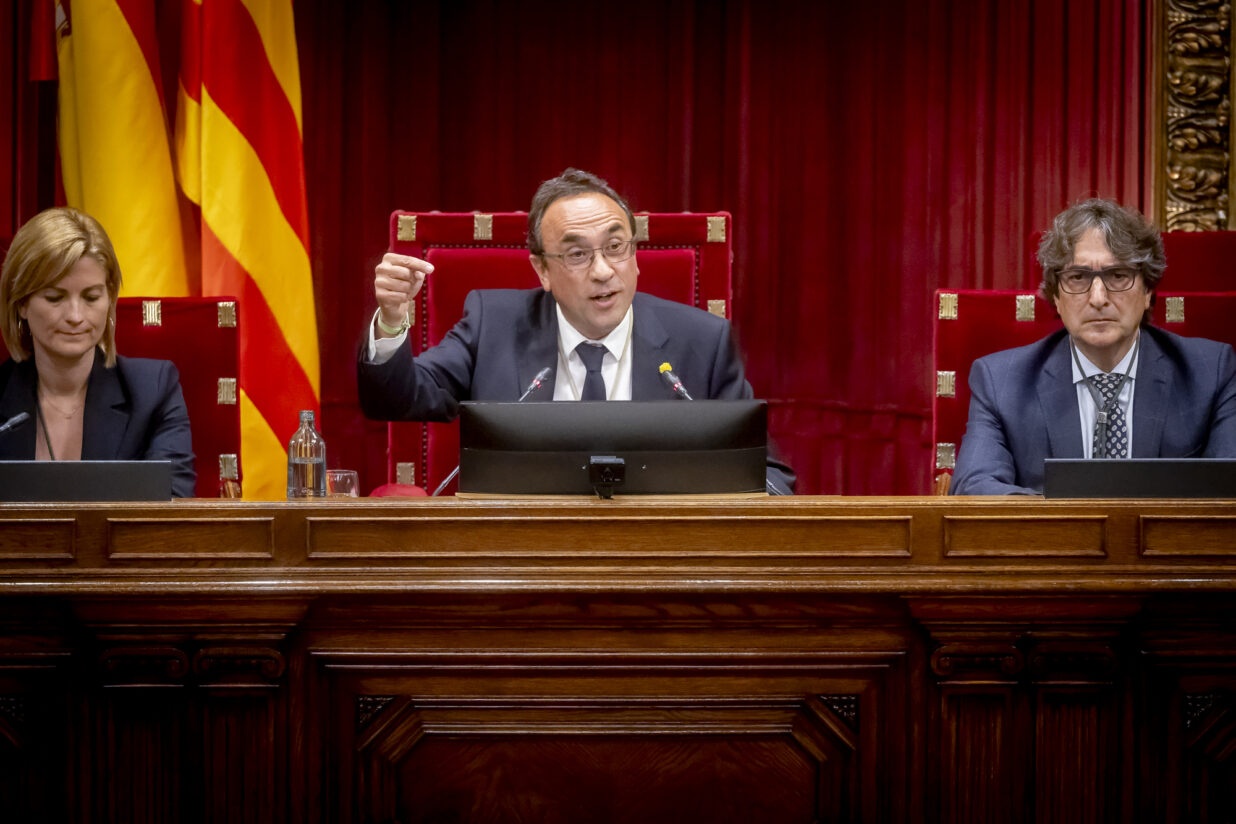10.06.2024 - 20:50
|
Actualització: 11.06.2024 - 08:34
The Junts deputy and former minister Josep Rull has been elected as the new President of the Parliament of Catalonia with the support of the pro-independence parties. Junts, ERC, and the CUP.
The new president was sentenced to ten years in prison by the Supreme Court of Spain for his role in the 2017 self-determination referendum and the subsequent declaration of independence. He spent three years in prison before being pardoned by the Spanish government.
As part of Rull’s pact it was also agreed that Raquel Sans (ERC) would be the first vice-president, and David Pérez (PSC), the second vice-president. The secretaries will be Glòria Freixa (Junts) as the first secretary; Juli Fernández (ERC) as the second secretary; Rosa Maria Ibarra (PSC) as the third secretary, and Judith Alcalá (PSC) as the fourth secretary.
These appointments ensure that the board of the chamber remains under an pro-independence majority with four representatives (two from Junts and two from ERC) against three (the three from PSC).
The new President reiterated “the conviction that democracy always prevails” in his first speech in office, asserting that the constitution of the fifteenth legislature “represents that hope is more powerful than fear.” This is the same phrase that the former councilor used during the trial of the Catalan leaders in Madrid.
Rull began his speech by recalling the empty seats representing the exiled deputies – Carles Puigdemont, Lluís Puig, and Ruben Wagensberg – and delved into the history of the parliament as a symbol of the history of the Catalan people. In this regard, he emphasized the symbolic value of President Francesc Macià’s decision to make the Citadel the seat of the Parliament of Catalonia. “What was a symbol to overthrow the freedoms of Catalonia has ended up being a symbol of Catalonia’s sovereignty,” he declared.
In this sense, Rull highlighted the “historical continuity” of the parliament, “which does not originate from the Spanish constitution of 1978, but is the expression of a millenary nation that goes beyond centuries.” He noted that Pere Aragonès is the one hundred and thirty-second President of the Generalitat.
At the same time, the new President of the chamber recalled how, during the Franco dictatorship, the parliament’s entrances were bricked up, and “the democratic will of the people of Catalonia was gagged.” He added: “Let us vow that this will never happen again,” he continued.
“Let us not forget an essential principle: these seats are not ours; they belong to the people we represent. Therefore, the seats must represent not the struggle between us but the general interest, the common good,” he emphasized.
And he continued: “We must be capable of representing a diverse Catalonia. This must be a country where social mobility works, and Catalan schools are a fundamental part of this social mobility.”
Rull then once again recalled the absence of the exiled deputies and lamented, alluding to political and judicial repression, that “we have lived through years in which what we thought was obvious has been questioned.” In this regard, he promised that the board will ensure the principle of parliamentary inviolability of deputies during the legislature. “No deputy can be prosecuted for freely expressing their opinion. But this fundamental principle, which seemed so obvious, has not been respected in recent years,” he said, recalling that Carme Forcadell, as President of the parliament, was sentenced to eleven and a half years in prison for “allowing a parliamentary debate.”
“I commit to protecting the rights of the deputies. In this parliament, everything must be open to debate, without the pressure of another public power and no other constraint than the will of the people of Catalonia who elected these 135 deputies,” he continued. And he reiterated “the anomaly” that “a President of the Generalitat can be dismissed by decree of a President of another government, or that the judiciary decides who can be subjected to investiture.”



